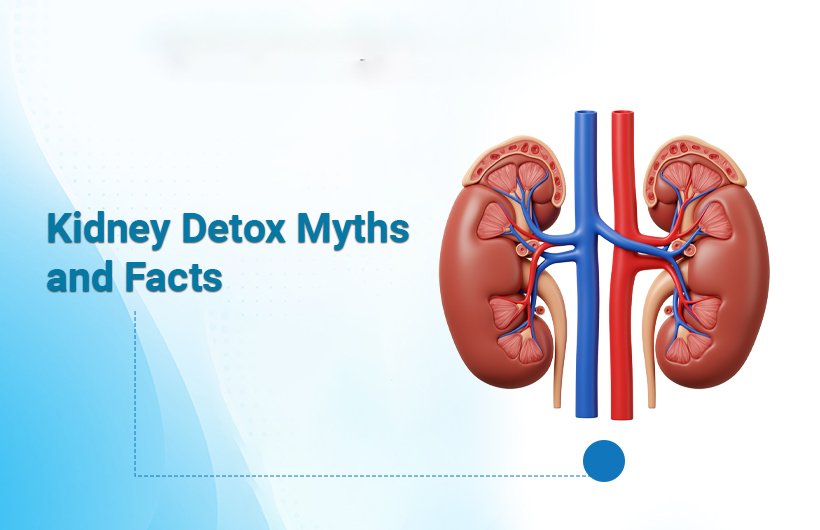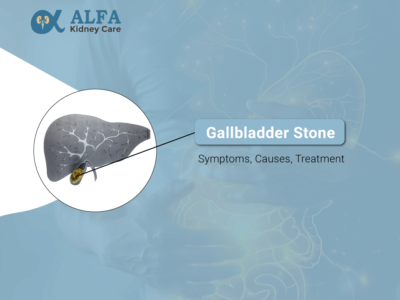Kidneys are among the hardest-working organs in your body, silently performing life-saving functions every second. They filter waste, balance fluids, regulate blood pressure, and maintain essential mineral levels without needing your conscious input.
Despite their efficiency, “kidney detox” products, diets, and hacks have exploded online in recent years, claiming to cleanse, heal, or boost kidney function. But how much of this is true, and how much is just marketing hype?
In this blog, we’ll separate fact from fiction, using reliable information from the National Institutes of Health (NIH) and the World Health Organisation (WHO) to explore common kidney detox myths and share science-backed tips for real kidney health.
What Does “Kidney Detox” Really Mean?
When people talk about a “kidney detox,” they usually mean using certain foods, drinks, supplements, or herbal remedies to:
- Remove toxins from the kidneys
- Improve kidney function
- Prevent kidney disease
Here’s the truth: Your kidneys are your body’s natural detox system.
According to the NIH, healthy kidneys filter about 50 gallons of blood daily, removing excess fluids, waste products, and harmful substances while keeping important nutrients and minerals. They also regulate blood pressure, stimulate red blood cell production, and keep bones healthy.
So, if your kidneys are functioning normally, they do not need an external “detox” boost. The body’s natural filtration system is more effective than any tea, juice, or cleanse you’ll find on the market.
Why Are Kidney Detox Myths So Popular?
If kidneys already detox naturally, why do “kidney cleanse” trends still take over social media? There are several reasons:
- Catchy marketing – Wellness brands promote detox products with promises of quick results and improved energy.
- Influencer culture – Short videos and posts often oversimplify complex medical facts to make them more shareable.
- Fear of toxins – Many people worry about environmental chemicals, processed foods, and lifestyle stressors harming their kidneys.
- Hope for a quick fix – Those with early kidney problems may feel desperate for natural solutions and get drawn into unproven remedies.
Unfortunately, this combination of fear, marketing, and half-truths allows kidney detox myths to spread rapidly even when they have little to no scientific support.
Common Kidney Detox Myths and the Facts
Let’s examine the most common myths and reveal the truth.
Myth 1: You don’t need fancy teas or juices to cleanse your kidneys.
Fact: Your kidneys are self-cleaning organs; all they need is adequate hydration and healthy nutrition. Kidney teas often contain herbs like parsley, dandelion root, or nettle leaf.
While these may have mild diuretic effects, health experts warn that certain herbal products can be harmful, especially for those with kidney disease or those taking certain medications.
The safest approach? Drink water, eat a balanced diet, and avoid unnecessary supplements unless prescribed by your doctor.
Myth 2: Detox diets can reverse kidney disease.
Fact: No detox diet can cure kidney disease. Medical care is essential for managing kidney conditions.
Chronic kidney disease (CKD) is often caused by diabetes, high blood pressure, or other underlying health problems. According to the NIH, treatment focuses on controlling these conditions, slowing disease progression, and preventing complications, not “flushing out” damage.
While a healthy diet can support kidney function, it’s not a cure. In advanced cases, dialysis or transplant may be required.
Myth 3: Drinking too much water always helps.
Fact: Excess water can be dangerous for some people.
Yes, staying hydrated supports kidney function, but more isn’t always better. Overhydration can cause low sodium levels (hyponatremia) and place extra strain on the kidneys, particularly in people with kidney or heart conditions.
The WHO recommends adjusting your water intake based on body size, climate, and activity level. A general guideline for healthy adults is about 2–3 litres a day, but your doctor can provide the safest amount for you.
Myth 4: Lemon water alone detoxes the kidneys.
Fact: Lemon water can help prevent certain kidney stones, but it’s not a magic detox solution.
Citrate in lemons can reduce the formation of some kidney stones. Lemon water is a great way to add variety to your fluid intake, but it can’t replace other healthy habits or medical treatments.
What Actually Works for Kidney Health (According to Science)
If you want to keep your kidneys healthy, focus on long-term, evidence-based habits rather than quick fixes.
- Drink adequate water – Sufficient hydration helps flush out waste, but follow your doctor’s advice for the right amount.
- Eat a balanced diet – Include fresh fruits, vegetables, whole grains, and lean proteins while limiting salt, sugar, and processed foods.
- Manage blood pressure and blood sugar – Both high BP and uncontrolled diabetes are leading causes of kidney damage.
- Be cautious with supplements – Some herbs and high-dose vitamins can be toxic to the kidneys.
- Limit long-term painkiller use – Overuse of NSAIDs (like ibuprofen) can harm kidney tissue.
- Maintain a healthy weight – Obesity increases the risk of diabetes and hypertension, which in turn affect kidney health.
How to Naturally Support Your Kidneys Daily
Here’s a quick reference for everyday kidney care:
- Stay hydrated – Sip water steadily throughout the day instead of chugging it all at once.
- Eat more fruits & vegetables – They’re high in antioxidants and nutrients that support kidney function.
- Limit salt – Excess sodium can raise blood pressure and harm kidneys.
- Avoid processed foods – They often contain hidden salt, phosphorus, and preservatives.
- Exercise regularly – Even 30 minutes of walking can improve circulation and overall health.
- Avoid smoking & excess alcohol – Both reduce blood flow to the kidneys and increase disease risk.
When to See a Doctor About Your Kidneys
Early kidney problems can be silent, so regular check-ups are important, especially if you have diabetes, high blood pressure, or a family history of kidney disease.
Seek medical advice if you notice:
- Ongoing swelling in the feet, ankles, or around the eyes may signal an underlying health issue.
- Unexplained changes in urine (colour, amount, frequency, foaminess)
- Constant fatigue or weakness
- Ongoing back or side pain
- Unexplained weight loss, nausea, or loss of appetite
Prompt diagnosis can prevent further damage and improve long-term outcomes.
Conclusion
Kidney detox myths may sound appealing, but your kidneys are already exceptional detoxifiers when healthy. You don’t need expensive teas, restrictive diets, or extreme water intake to keep them working well.
Instead, invest in proven, science-backed habits: drink enough water, eat a balanced diet, keep blood pressure and blood sugar under control, avoid unnecessary supplements, and get regular medical check-ups.
Dr. Ravi Bhadania emphasises that kidney health is about consistency, not quick fixes. If you’re thinking about starting any detox plan, always talk to a kidney specialist first, especially if you already have kidney concerns.
Take care of your kidneys with facts, not fads.


